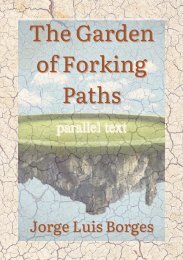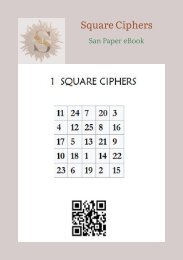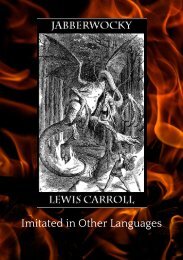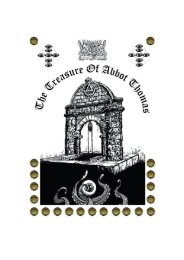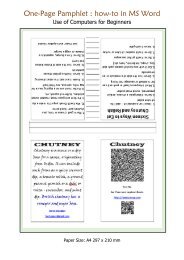Invisible-Cities-Part1
Parallel-Text Italian and English
Parallel-Text Italian and English
Create successful ePaper yourself
Turn your PDF publications into a flip-book with our unique Google optimized e-Paper software.
Italo Calvino<br />
Le città invisibili<br />
di Italo Calvino<br />
Non è detto che Kublai Kan creda a tutto quel che dice Marco<br />
Polo quando gli descrive le città visitate nelle sue ambascerie,<br />
ma certo l’imperatore dei tartari continua ad ascoltare il<br />
giovane veneziano con piú curiosità e attenzione che ogni altro<br />
suo messo o esploratore. Nella vita degli imperatori c’è un<br />
momento, che segue all’orgoglio per l’ampiezza sterminata dei<br />
territori che abbiamo conquistato, alla malinconia e al sollievo<br />
di sapere che presto rinunceremo a conoscerli e a comprenderli;<br />
un senso come di vuoto che ci prende una sera con l’odore degli<br />
elefanti dopo la pioggia e della cenere di sandalo che si<br />
raffredda nei bracieri; una vertigine che fa tremare i fiumi e le<br />
montagne istoriati sulla fulva groppa dei planisferi, arrotola<br />
uno sull’altro i dispacci che ci annunciano il franare degli ultimi<br />
eserciti nemici di sconfitta in sconfitta, e scrosta la ceralacca dei<br />
sigilli di re mai sentiti nominare che implorano la protezione<br />
delle nostre armate avanzanti in cambio di tributi<br />
2
<strong>Invisible</strong> <strong>Cities</strong><br />
<strong>Invisible</strong> <strong>Cities</strong><br />
I<br />
Kublai Khan does not necessarily believe<br />
everything Marco Polo says when he describes the<br />
cities visited in his embassies, but certainly the<br />
Emperor of the Tartars continues to listen to the<br />
young Venetian with more curiosity and attention<br />
than any other messenger or explorer. There is a<br />
moment in the life of emperors, which follows our<br />
pride for the immense breadth of the territories<br />
that we have conquered, the melancholy and relief<br />
of knowing that we will soon give up knowing and<br />
understanding them; a sense of emptiness that<br />
takes us one evening with the smell of elephants<br />
after the rain and sandalwood ash that cools in the<br />
braziers; a dizziness that makes the rivers and<br />
mountains shudder on the tawny curve of the<br />
planispheres, rolls up the dispatches that announce<br />
the collapse of the last enemy armies in confusion<br />
and defeat, and scrapes the seals of kings never<br />
heard of who implore the protection of our<br />
advancing armies in exchange for annual tributes<br />
of precious<br />
3
Italo Calvino<br />
annuali in metalli preziosi, pelli conciate e gusci di<br />
testuggine: è il momento disperato in cui si scopre che<br />
quest’impero che ci era sembrato la somma di tutte le<br />
meraviglie è uno sfacelo senza fine né forma che la sua<br />
corruzione è troppo incancrenita perché il nostro scettro<br />
possa mettervi riparo, che il trionfo sui sovrani avversari ci<br />
ha fatto eredi della loro lunga rovina. Solo nei resoconti di<br />
Marco Polo, Kublai Kan riusciva a discernere, attraverso le<br />
muraglie e le torri destinate a crollare, la filigrana d’un<br />
disegno cosí sottile da sfuggire al morso delle termiti.<br />
4
<strong>Invisible</strong> <strong>Cities</strong><br />
metals, tanned hides and tortoise shells: it is the<br />
desperate moment when it turns out that this<br />
empire that had seemed to us the sum of all<br />
wonders is an endless collapse with no form, that<br />
its corruption is too gangrenous for our scepter to<br />
shelter anyone, that the triumph over opposing<br />
sovereigns has made us heirs to their long ruin.<br />
Only in Marco Polo's reports, Kublai Khan was able<br />
to discern, through the walls and towers destined<br />
to collapse, the filigree of a design so subtle as to<br />
escape the nibbling of termites.<br />
5
Italo Calvino<br />
Le città e la memoria. 1.<br />
Partendosi di là e andando tre giornate verso levante,<br />
l’uomo si trova a Diomira, città con sessanta cupole<br />
d’argento, statue in bronzo di tutti gli dei, vie lastricate in<br />
stagno, un teatro di cristallo, un gallo d’oro che canta ogni<br />
mattina su una torre. Tutte queste bellezze il viaggiatore<br />
già conosce per averle viste anche in altre città. Ma la<br />
proprietà di questa è che chi vi arriva una sera di<br />
settembre, quando le giornate s’accorciano e le lampade<br />
multicolori s’accendono tutte insieme sulle porte delle<br />
friggitorie, e da una terrazza una voce di donna grida: uh!,<br />
viene da invidiare quelli che ora pensano d’aver già vissuto<br />
una sera uguale a questa e d’esser stati quella volta felici.<br />
6
<strong>Invisible</strong> <strong>Cities</strong><br />
<strong>Cities</strong> and memory. 1.<br />
Starting from there and going three days to the<br />
east, a man finds himself in Diomira, a city with<br />
sixty silver domes, bronze statues of all the gods,<br />
streets cobbled in tin, a crystal theater, a golden<br />
cock that crows every morning on a tower. The<br />
traveller already knows all these beauties from<br />
having seen them in other cities as well. But the<br />
special quality of this quest is for you to arrive here<br />
on an evening in September, when the days grow<br />
shorter and the multicolored lamps light up<br />
together on the doors of the fast food vendors, and<br />
from a terrace a woman's voice shouts: Hah!, come<br />
here to envy those who think they have spent an<br />
evening like this once before and had a good time.<br />
7
Italo Calvino<br />
Le città e la memoria. 2.<br />
All’uomo che cavalcava lungamente per terreni selvatici<br />
viene desiderio d’una città. Finalmente giunge a Isidora,<br />
città dove i palazzi hanno scale a chiocciola incrostate di<br />
chiocciole marine, dove si fabbricano a regola d’arte<br />
cannocchiali e violini, dove quando il forestiero è incerto<br />
tra due donne ne incontra sempre una terza, dove le lotte<br />
dei galli degenerano in risse sanguinose tra gli<br />
scommettitori. A tutte queste cose egli pensava quando<br />
desiderava una città. Isidora è dunque la città dei suoi<br />
sogni: con una differenza. La città sognata conteneva lui<br />
giovane; a Isidora arriva in tarda età. Nella piazza c’è il<br />
muretto dei vecchi che guardano passare la gioventú; lui è<br />
seduto in fila con loro. I desideri sono già ricordi.<br />
8
<strong>Invisible</strong> <strong>Cities</strong><br />
<strong>Cities</strong> and memory. 2.<br />
When a man rides for a long time through a<br />
wilderness he comes yearning for a city. Finally he<br />
reaches Isidora, a city where the buildings have<br />
spiral staircases encrusted with helical seashells,<br />
where spyglasses and violins are made to<br />
perfection, where if the stranger is torn between<br />
two women he always meets a third, where the<br />
cock fights degenerate into bloody brawls among<br />
punters. He thought about all these things when he<br />
desired a city. Isidora is therefore the city of his<br />
dreams - with a difference. The city is a dream of<br />
his youth and he comes to Isidora in late age. In<br />
the square there is a wall for old people who watch<br />
the young go by; he is sitting in line with them and<br />
his desires are merely memories.<br />
9
Italo Calvino<br />
Le città e il desiderio. 1.<br />
Della città di Dorotea si può parlare in due maniere: dire<br />
che quattro torri d’alluminio s’elevano dalle sue mura<br />
fiancheggiando sette porte dal ponte levatoio a molla che<br />
scavalca il fossato la cui acqua alimenta quattro verdi<br />
canali che attraversano la città e la dividono in nove<br />
quartieri, ognuno di trecento case e settecento fumaioli; e<br />
tenendo conto che le ragazze da marito di ciascun<br />
quartiere si sposano con giovani di altri quartieri e le loro<br />
famiglie si scambiano le mercanzie che ognuna ha in<br />
privativa: bergamotti, uova di storione, astrolabi, ametiste,<br />
fare calcoli in base a questi dati fino a sapere tutto quello<br />
che si vuole della città nel passato nel presente nel futuro;<br />
oppure dire come il cammelliere che mi condusse laggiú:<br />
“Vi arrivai nella prima giovinezza, una mattina, molta<br />
gente andava svelta per le vie verso il mercato, le donne<br />
avevano bei denti e guardavano dritto negli occhi, tre<br />
soldati sopra un palco suonavano il clarino, dappertutto<br />
intorno giravano ruote e sventolavano scritte colorate.<br />
10
<strong>Invisible</strong> <strong>Cities</strong><br />
<strong>Cities</strong> and desire. 1.<br />
We can talk about the city of Dorothea in two<br />
ways: you can say that four aluminum towers rise<br />
from its walls flanking seven gates from the springdriven<br />
drawbridge that bestrides the moat whose<br />
water feeds four green canals that cross the city<br />
dividing it into nine quarters, each with three<br />
hundred houses and seven hundred chimneys; and<br />
taking into account that the marriageable girls of<br />
each neighborhood marry with young people from<br />
other neighborhoods and their families exchange<br />
the merchandise to which each one has the<br />
exclusive right: bergamots, sturgeon roe,<br />
astrolabes, amethysts, you can make calculations<br />
based on these data until you know everything you<br />
want about the city in the past in the present in the<br />
future; or say like the camel driver who led me<br />
over there: “I arrived here in my early youth, one<br />
morning, many people went quickly through the<br />
streets towards the market, the women had<br />
beautiful teeth and looked everyone straight in the<br />
eyes, three soldiers on a stage played the clarino<br />
trumpet, everywhere wheels revolved and waved<br />
colourful writing.<br />
11
Italo Calvino<br />
Prima d’allora non avevo conosciuto che il deserto e le<br />
piste delle carovane. Quella mattina a Dorotea sentii che<br />
non c’era bene della vita che non potessi aspettarmi. Nel<br />
seguito degli anni i miei occhi sono tornati a<br />
contemplare le distese del deserto e le piste delle<br />
carovane; ma ora so che questa è solo una delle tante<br />
vie che mi si aprivano quella mattina a Dorotea”.<br />
12
<strong>Invisible</strong> <strong>Cities</strong><br />
Before then I had only known the desert and the<br />
caravan tracks. That morning in Dorothea I felt<br />
that there was no good in life that I could not<br />
expect. Over the years my eyes have returned to<br />
contemplate the expanses of the desert and the<br />
tracks of the caravans; but now I know that this is<br />
only one of the many ways that opened up to me<br />
that morning in Dorothea.”<br />
13
Italo Calvino<br />
città e la memoria. 3.<br />
Inutilmente, magnanimo Kublai, tenterò di descriverti la<br />
città di Zaira dagli alti bastioni. Potrei dirti di quanti<br />
gradini sono le vie fatte a scale, di che sesto gli archi dei<br />
porticati, di quali lamine di zinco sono ricoperti i tetti; ma<br />
so già che sarebbe come non dirti nulla. Non di questo è<br />
fatta la città, ma di relazioni tra le misure del suo spazio e<br />
gli avvenimenti del suo passato: la distanza dal suolo d’un<br />
lampione e i piedi penzolanti d’un usurpatore impiccato; il<br />
filo teso dal lampione alla ringhiera teo nuziale della<br />
regina; l’altezza di quella ringhiera e il salto dell’adultero<br />
d’una grondaia e l’incedervi d’un gatto che si infila nella<br />
stessa finestra; la linea di tiro della nave cannoniera<br />
apparsa all’improvviso dietro il capo e la bomba che di<br />
strugge la grondaia; gli strappi delle reti da pesca e i tre<br />
vecchi che seduti sul molo a rammendare le reti si<br />
raccontano per la centesima volta la storia della cannoniera<br />
dell’usurpatore, che si dice fosse un figlio adulterino della<br />
regina, abbandonato in fasce lí sul molo.<br />
14
<strong>Invisible</strong> <strong>Cities</strong><br />
<strong>Cities</strong> and memory. 3.<br />
To no avail, magnanimous Kublai, I will attempt to<br />
describe the city of Zaira with its high ramparts. I<br />
could tell you how many steps are the streets made<br />
of stairs, of what proportions the arches of the<br />
arcades, where zinc foil covers the roofs; but I<br />
already know it would be like telling you nothing.<br />
The city is not made of this, but of relationships<br />
between the measures of its space and the events<br />
of its past: the distance from the ground of a<br />
lamppost and the dangling feet of a hanged<br />
usurper; the thread stretched from the lamppost to<br />
the queen's wedding railing; the height of that<br />
railing and the leap of an adulterer across a gutter<br />
and the arrival of a cat who slips into the same<br />
window; the firing range of a gunboat suddenly<br />
appearing from behind the cape and the bomb<br />
destroying the eaves; the tears of the fishing nets<br />
and the three old men who sit on the pier mending<br />
the nets telling for the hundredth time the story of<br />
the usurper’s gunboat, said to be an adulterous son<br />
of the queen, who was abandoned in swaddling<br />
clothes there on the pier.<br />
15
Italo Calvino<br />
Di quest’onda che rifluisce dai ricordi la citta s’imbeve<br />
come una spugna e si dilata. Una descrizione di Zaira<br />
quale è oggi dovrebbe contenere tutto il passato di Zaira.<br />
Ma la città non dice il suo passato, lo contiene come le linee<br />
d’una mano, scritto negli spigoli delle vie, nelle griglie<br />
delle finestre, negli scorrimano delle scale, nelle antenne<br />
dei parafulmini, nelle aste delle bandiere, ogni segmento<br />
rigato a sua volta di graffi, seghettature, intagli, svirgole.<br />
16
<strong>Invisible</strong> <strong>Cities</strong><br />
The city imbues itself like a sponge and expands out<br />
of this wave that flows from memories. A description<br />
of Zaira as it is today should contain all of Zaira's past.<br />
But the city does not tell its past, it contains it like the<br />
lines of a hand, written in the corners of the streets, in<br />
the grates of the windows, in the handrails of the<br />
stairs, in the antennas of the lightning rods, in the<br />
flagpoles, each segment in turn streaked with<br />
scratches, serrations, gouges, commas.<br />
17
Italo Calvino<br />
Le città e il desiderio. 2.<br />
Di capo a tre giornate, andando verso mezzodí, l’uomo si<br />
incontra ad Anastasia, città bagnata da canali concentrici e<br />
sorvolata da aquiloni. Dovrei ora enumerare le merci che qui si<br />
comprano con vantaggio: agata onice crisopazio e altre varietà<br />
di calcedonio; lodare la carne del fagiano dorato che qui si<br />
cucina sulla fiamma di legno di ciliegio stagionato e si<br />
cosparge con molto origano; dire delle donne che ho visto fare<br />
il bagno nella vasca d’un giardino e che talvolta invitano – si<br />
racconta – il passeggero a spogliarsi con loro e a rincorrerle<br />
nell’acqua. Ma con queste notizie non ti direi la vera essenza<br />
della città: perché mentre la descrizione di Anastasia non fa<br />
che risvegliare i desideri uno per volta per obbligarti a<br />
soffocarli, a chi si trova un mattino in mezzo ad Anastasia i<br />
desideri si risvegliano tutti insieme e ti cirLa città ti appare<br />
come un tutto in cui nessun desiderio va perduto e di cui tu fai<br />
parte, e poiché essa gode tutto quello che tu non godi, a te non<br />
resta che abitare questo desiderio ed esserne contento. Tale<br />
potere, che ora dicono maligno ora benigno, ha<br />
18
<strong>Invisible</strong> <strong>Cities</strong><br />
<strong>Cities</strong> and desire. 2.<br />
After three days, going towards the south, you find<br />
yourself in Anastasía, a city bathed by concentric<br />
canals and overflown by kites. I should now list the<br />
goods that are bought here with advantage: agate,<br />
onyx, chrysoprase and other varieties of chalcedony;<br />
praise the meat of the golden pheasant which is<br />
cooked here on the flame of seasoned cherry wood<br />
and is sprinkled with much oregano; talk about the<br />
women I saw bathing in a garden pool and who<br />
sometimes invite - it is said - the passer-by to undress<br />
with them and chase them in the water. But with these<br />
news I would not tell you the true essence of the city:<br />
because while Anastasía's description only awakens<br />
the desires one at a time to force you to stifle them,<br />
those who find themselves one morning in the midst of<br />
Anastasía when desires awaken all together and the<br />
city appears to you as a whole in which no desire is<br />
lost and of which you are part, and since it enjoys all<br />
that you do not enjoy, you just have to live with this<br />
desire and be content with it. This power, which they<br />
sometimes call malignant and at other times benign,<br />
19
Italo Calvino<br />
Anastasia, città ingannatrice: se per otto ore al giorno tu lavori<br />
come tagliatore d’agate onici crisopazi, la tua fatica che dà<br />
forma al desiderio prende dal desiderio la sua forma, e credi di<br />
godere per tutta Anastasia mentre non ne sei che lo schiavo.<br />
20
<strong>Invisible</strong> <strong>Cities</strong><br />
is Anastasía, a deceiving city: if for eight hours a day<br />
you work as a cutter of agate, onyx, chrysoprase, your<br />
effort that gives shape to desire takes form from<br />
desire and you believe you are wholly enjoying<br />
Anastasía while you are merely its slave.<br />
21
Italo Calvino<br />
Le città e i segni. 1.<br />
L’uomo cammina per giornate tra gli alberi e le pietre.<br />
Raramente l’occhio si ferma su una cosa, ed è quando l’ha<br />
riconosciuta per il segno d’un altra cosa: un’impronta sulla<br />
sabbia indica il passaggio della tigre, un pantano annuncia una<br />
vena d’acqua, il fiore dell’ibisco la fine dell’inverno. Tutto il<br />
resto è muto e intercambiabile; alberi e pietre Finalmente il<br />
viaggio conduce alla città di Tamara. Ci si addentra per vie<br />
fitte d’insegne che sporgono dai muri. L’occhio non vede cose<br />
ma figure di cose che significano altre cose: la tenaglia indica<br />
la casa del cavadenti, il boccale la taverna, le alabarde il corpo<br />
di guardia, la stadera l’erbivendola. Statue e scudi<br />
rappresentano leoni delfini torri stelle: segno che qualcosa –<br />
chissà cosa – ha per segno un leone o delfino o torre o stella.<br />
Altri segnali avvertono di ciò che in un luogo è proibito –<br />
entrare nel vicolo con i carretti, orinare dietro l’edicola, pescare<br />
con la canna dal ponte – e di ciò che è lecito – abbeverare le<br />
zebre, giocare a bocce, bruciare i cadaveri dei parenti.<br />
22
<strong>Invisible</strong> <strong>Cities</strong><br />
<strong>Cities</strong> and signs. 1.<br />
You walk for days among the trees and the stones.<br />
The eye rarely stops on one thing, and it is when you<br />
recognize it for the sign of another thing: a footprint<br />
on the sand indicates the passage of the tiger, a<br />
quagmire announces a vein of water, the hibiscus<br />
flower the end of winter. All the rest is silent and<br />
interchangeable; trees and stones Finally the journey<br />
leads to the city of Tamara. You enter through streets<br />
full of signs that protrude from the walls. The eye does<br />
not see things but figures of things that mean other<br />
things: the pincer indicates the house of the toothdrawer,<br />
the mug the tavern, the halberds the<br />
guardhouse, the weigh-bar the greengrocer. Statues<br />
and shields represent lions, dolphins, towers, stars: a<br />
sign that something - who knows what - has as its<br />
sign a lion or dolphin or tower or star. Other signs<br />
warn of what is forbidden in a place - entering the<br />
alley with carts, urinating behind the kiosk, fishing<br />
with a rod from the bridge - and what is legitimate -<br />
watering the zebras, playing bowls, burning the<br />
corpses of parents.<br />
23
Italo Calvino<br />
Dalla porta dei templi si vedono le statue degli dei,<br />
raffigurati ognuno coi suoi attributi: la cornucopia, la clessidra,<br />
la medusa, per cui il fedele può riconoscerli e rivolgere loro le<br />
preghiere giuste.<br />
Se un edificio non porta nessuna insegna o figura, la sua<br />
stessa forma e il posto che occupa nell’ordine della città<br />
bastano a indicarne la funzione: la reggia, la prigione, la zecca,<br />
la scuola pitagorica, il bordello. Anche le mercanzie che i<br />
venditori mettono in mostra sui banchi valgono non per se<br />
stesse ma come segni d’altre cose: la benda ricamata per la<br />
fronte vuol dire eleganza, la portantina dorata potere, i volumi<br />
di Averroè sapienza, il monile per la caviglia voluttà. Lo<br />
sguardo percorre le vie come pagine scritte: la città dice tutto<br />
quello che devi pensare, ti fa ripetere il suo discorso, e mentre<br />
credi di visitare Tamara non fai che registrare i nomi con cui<br />
essa definisce se stessa e tutte le sue parti.<br />
Come veramente sia la città sotto questo fitto involucro di<br />
segni, cosa contenga o nasconda, l’uomo esce da Tamara senza<br />
averlo saputo. Fuori s’estende la<br />
24
<strong>Invisible</strong> <strong>Cities</strong><br />
From the door of the temples you can see the<br />
statues of the gods, each depicted with its attributes:<br />
the cornucopia, the hourglass, the jellyfish, so the<br />
faithful can recognize them and give them the correct<br />
prayers.<br />
If a building bears no sign or figure, its shape and<br />
the place it occupies in the order of the city are<br />
enough to indicate its function: the palace, the prison,<br />
the mint, the Pythagorean school, the brothel. Even<br />
the merchandise that the sellers put on display on<br />
their counters are not valued in themselves but as<br />
signs of other things: the embroidered headband<br />
stands for elegance, the gilded palanquin, power, the<br />
volumes of Averroës, wisdom, the ankle bracelet,<br />
voluptuousness. Your gaze scans the streets as if they<br />
were written pages: the city says everything you need<br />
to think, it makes you repeat its discourse, and while<br />
you think you are visiting Tamara you only record the<br />
names with which she defines herself and all her parts.<br />
How truly the city is under this dense envelope of<br />
signage, whatever it contains or hides, a man leaves<br />
Tamara without having known the place. Outside, the<br />
empty earth<br />
25
Italo Calvino<br />
terra vuota fino all’orizzonte, s’apre il cielo dove corrono le<br />
nuvole. Nella forma che il caso e il vento dànno alle nuvole<br />
l’uomo è già intento a riconoscere figure: un veliero, una<br />
mano, un elefante ...<br />
26
<strong>Invisible</strong> <strong>Cities</strong><br />
extends to the horizon, the sky opens where the<br />
clouds run. In the form that chance and wind give to<br />
clouds, one is already intent on recognizing figures: a<br />
sailing ship, a hand, an elephant …<br />
27
Italo Calvino<br />
Le città e la memoria. 4.<br />
Al di là di sei fiumi e tre catene di montagne sorge Zora, città<br />
che chi l’ha vista una volta non può piú dimenticare. Ma non<br />
perché essa lasci come altre città memorabili un’immagine<br />
fuor del comune nei ricordi. Zora ha la proprietà di restare<br />
nella memoria punto per punto, nella successione delle vie, e<br />
delle case lungo le vie, e delle porte e delle finestre nelle case,<br />
pur non mostrando in esse bellezze o rarità particolari. Il suo<br />
segreto è il modo in cui la vista scorre su figure che si<br />
succedono come in una partitura musicale nella quale non si<br />
può cambiare o spostare una sola nota. L’uomo che sa a<br />
memoria com’è fatta Zora, la notte quando non può dormire<br />
immagina di camminare per le sue vie e ricorda l’ordine in cui<br />
si succedono l’orologio di rame, la tenda a strisce del barbiere,<br />
lo zampillo dai nove schizzi, la torre di vetro dell’astronomo,<br />
la edicola del venditore di cocomeri, la statua dell’eremita e<br />
del leone, il bagno turco, il caffè all’angolo, la traversa che va<br />
al porto. Questa città che non si cancella dalla mente e come<br />
un’armatura o reticolo nelle cui caselle ognuno può disporre le<br />
cose che vuole ricordare: nomi di uomini illustri, virtú,<br />
28
<strong>Invisible</strong> <strong>Cities</strong><br />
<strong>Cities</strong> and memory. 4.<br />
Beyond six rivers and three mountain chains stands<br />
Zora, a city that those who have seen it once can no<br />
longer forget. But not because, like other memorable<br />
cities, it leaves an image out of the ordinary in<br />
memories. Zora has the property of remaining in the<br />
memory point by point, in the succession of the<br />
streets, and of the houses along the streets, and of<br />
the doors and windows in the houses, while not<br />
showing in them particular beauties or rarities. Its<br />
secret is the way in which the sight flows on figures<br />
that follow one another as in a musical score in which<br />
a single note cannot be changed or moved. The man<br />
who knows how Zora is made, at night when he<br />
cannot sleep, imagines walking in its streets and<br />
remembers the order in which the copper clock, the<br />
striped awning of the barber, the fountain with nine<br />
spouts, the glass tower of the astronomer, the kiosk of<br />
the watermelon seller, the statue of the hermit and<br />
the lion, the Turkish bath, the coffee house on the<br />
corner, the intersection that goes to the port. This city<br />
is not erased from the mind and resembles an armoire<br />
or lattice of boxes in which everyone can arrange the<br />
things they<br />
29
Italo Calvino<br />
numeri, classificazioni vegetali e minerali, date di battaglie,<br />
costellazioni, parti del discorso. Tra ogni nozione e ogni punto<br />
dell’itinerario potrà stabilire un nesso d’affinità o di contrasto<br />
che serva da richiamo istantaneo alla memoria. Cosicché gli<br />
uomini piú sapienti del mondo sono quelli che sanno a mente<br />
Zora. Ma inutilmente mi sono messo in viaggio per visitare la<br />
città: obbligata a restare immobile e uguale a se stessa per<br />
essere meglio ricordata, Zora languí, si disfece e scomparve. La<br />
Terra l’ha dimenticata.<br />
30
<strong>Invisible</strong> <strong>Cities</strong><br />
want to remember: names of illustrious men, virtues,<br />
numbers, vegetable and mineral classifications, dates<br />
of battles, constellations, parts of speech. Between<br />
each notion and each point of the itinerary, it may<br />
establish a link of affinity or contrast that serves as an<br />
instant reminder of the memory. So the most wise<br />
men in the world are those who have memorised Zora.<br />
But to no avail I went on a trip to visit the city: forced<br />
to remain motionless and always the same, in order to<br />
be better remembered, Zora languished, unraveled<br />
and disappeared. The Earth has forgotten her.<br />
31
Italo Calvino<br />
Le città e il desiderio 3<br />
In due modi si raggiunge Despina: per nave o per<br />
cammello. La città si presenta differente a chi viene da terra e a<br />
chi dal mare.<br />
Il cammelliere che vede spuntare all’orizzonte dell’altipiano<br />
i pinnacoli dei grattacieli, le antenne radar, sbattere le maniche<br />
a vento bianche e rosse, buttare fumo i fumaioli, pensa a una<br />
nave, sa che è una città ma la pensa come un bastimento che lo<br />
porti via dal deserto, un veliero che stia per salpare, col vento<br />
che già gonfia le vele non ancora slegate, o un vapore con la<br />
caldaia che vibra nella carena di ferro, e pensa a tutti i porti,<br />
alle merci d’oltremare che le gru scaricano sui moli, alle osterie<br />
dove equipaggi di diversa bandiera si rompono bottiglie sulla<br />
testa, alle finestre illuminate a pianterreno, ognuna con una<br />
donna che si pettina.<br />
32
<strong>Invisible</strong> <strong>Cities</strong><br />
<strong>Cities</strong> and desire 3<br />
Despina can be reached in two ways: by ship or by<br />
camel. The city displays one face to the traveler<br />
arriving overland and a different one to him who<br />
arrives by sea.<br />
The camel driver who sees the pinnacles of<br />
skyscrapers appear on the horizon of the plateau, the<br />
radar antennas, the white and red windsocks flapping,<br />
the funnels blowing smoke, thinks of a ship, knows<br />
that it is a city but thinks of it as a ship that takes him<br />
away from the desert, a sailing ship that is about to<br />
sail, with the wind already swelling the sails not yet<br />
unfurled, or a steamboat with its boiler vibrating in the<br />
iron hull; and thinks of all the ports, of the foreign<br />
goods that the cranes unload on the docks, of the<br />
taverns where crews of different flags break bottles on<br />
heads, at the illuminated windows on the ground floor,<br />
each with a woman combing her hair.<br />
33
Italo Calvino<br />
Nella foschia della costa il marinaio distingue la forma<br />
d’una gobba di cammello, d’una sella ricamata di frange<br />
luccicanti tra due gobbe chiazzate che avanzano dondolando,<br />
sa che è una città ma la pensa come un cammello dal cui basto<br />
pendono otri e bisacce di frutta candita, vino di datteri, foglie<br />
di tabacco, e già si vede in testa ad una lunga carovana che lo<br />
porta via dal deserto del mare, verso oasi d’acqua dolce<br />
all’ombra seghettata delle palme, verso palazzi dalle spesse<br />
mura di calce, dai cortili di piastrelle su cui ballano scalze le<br />
dannzatrici, e muovono le braccia un po’ nel velo e un po’<br />
fuori dal velo.<br />
Ogni città riceve la sua forma dal deserto a cui si oppone; e<br />
cosí il cammelliere e il marinaio vedono Despina, città di<br />
confine tra due deserti.<br />
34
<strong>Invisible</strong> <strong>Cities</strong><br />
In the coastline's haze, the sailor discerns the form<br />
of a camel's withers, an embroidered saddle with<br />
glittering fringe between two spotted humps,<br />
advancing and swaying; he knows it is a city, but he<br />
thinks of it as a camel from whose pack hang<br />
wineskins and bags of candied fruit, date wine,<br />
tobacco leaves, and already he sees himself at the<br />
head of a long caravan taking him away from the<br />
desert of the sea, toward oases of fresh water in the<br />
palm trees’ jagged shade, toward palaces of thick,<br />
whitewashed walls, tiled courts where girls are dancing<br />
barefoot, moving their arms, half-hidden by their veils,<br />
and half-revealed.<br />
Each city receives its form from the desert it<br />
opposes; and so the camel driver and the sailor see<br />
Despina, a border city confined between two deserts.<br />
35
Italo Calvino<br />
Le città e i segni. 2.<br />
Dalla città di Zirma i viaggiatori tornano con ricordi ben<br />
distinti: un negro cieco che grida nella folla, un pazzo che si<br />
sporge dal cornicione d’un grattacielo, una ragazza che<br />
passeggia con un puma legato al guinzaglio. In realtà molti dei<br />
ciechi che battono il bastone sui selciati di Zirma sono negri, in<br />
ogni grattacielo c’è qualcuno che impazzisce, tutti i pazzi<br />
passano le ore sui cornicioni, non c’è puma che non sia<br />
allevato per un capriccio di ragazza. La città è ridondante: si<br />
ripete perché qualcosa arrivi a fissarsi nella mente. Torno<br />
anch’io da Zirma: il mio ricordo comprende dirigibili che<br />
volano in tutti i sensi all’altezza delle finestre, vie di botteghe<br />
dove si disegnano tatuaggi sulla pelle ai marinai, treni<br />
sotterranei stipati di donne obese in preda all’afa. I compagni<br />
che erano con me nel viaggio invece giurano d’aver visto un<br />
solo dirigibile librarsi tra le guglie della città, un solo tatuatore<br />
disporre sul suo panchetto aghi e inchiostri e disegni traforati,<br />
una sola donna–cannone farsi vento sulla piattaforma d’un<br />
vagone. La memoria è ridondante: ripete i segni perché la città<br />
cominci a esistere.<br />
36
<strong>Invisible</strong> <strong>Cities</strong><br />
<strong>Cities</strong> and signs 2<br />
Travelers return from the city of Zirma with distinct<br />
memories: a blind black man shouting in the crowd, a<br />
lunatic teetering on a skyscraper's cornice, a girl<br />
walking with a puma on a leash. In reality, many of<br />
the blind men who tap their canes on Zirma's<br />
cobblestones are black; in every skyscraper there is<br />
someone going mad; all lunatics spend hours on<br />
cornices; there is no puma that some girl does not<br />
raise, as a whim. The city is redundant: it repeats<br />
itself so that something will stick in the mind. I too am<br />
returning from Zirma: my memory includes dirigibles<br />
flying in all directions, at window level; streets of<br />
shops where tattoos are drawn on sailors' skin;<br />
underground trains crammed with obese women<br />
suffering from the humidity. My traveling companions,<br />
on the other hand, swear they saw only one dirigible<br />
hovering among the city's spires, only one tattoo artist<br />
arranging needles and inks and pierced patterns on his<br />
bench, only one fat woman fanning herself on a train's<br />
platform. Memory is redundant: it repeats signs so<br />
that the city can begin to exist.<br />
37
Italo Calvino<br />
Le città sottili. 1.<br />
Isaura, città dai mille pozzi, si presume sorga sopra un<br />
profondo lago sotterraneo. Dappertutto dove gli abitanti<br />
scavando nella terra lunghi buchi verticali sono riusciti a tirar<br />
su dell’acqua, fin là e non oltre si è estesa la città: il suo<br />
perimetro verdeggiante ripete quello delle rive buie del lago<br />
sepolto, un paesaggio invisibile condiziona quello visibile,<br />
tutto ciò che si muove al sole è spinto dall’onda che batte<br />
chiusa sotto il cielo calcareo della roccia.<br />
Di conseguenza religioni di due specie si dànno a Isaura.<br />
Gli dei della città, secondo alcuni, abitano nella profondità, nel<br />
lago nero che nutre le vene sotterrranee. Secondo altri gli dei<br />
abitano nei secchi che risalgono appesi alla fune quando<br />
appaiono fuori della vera dei poz zi, nelle carrucole che girano,<br />
negli argani delle norie, nelle leve delle pompe, nelle pale dei<br />
mulini a vento che tirano su l’acqua delle trivellazioni, nei<br />
castelli di traliccio che reggono l’avvitarsi delle sonde, nei<br />
serbatoi pensili sopra i tetti in cima a trampoli, negli archi<br />
sottili degli acquedotti, in tutte le colonne d’acqua, i tubi<br />
verticali, i saliscendi,<br />
38
<strong>Invisible</strong> <strong>Cities</strong><br />
Thin cities 1:<br />
Isaura, city of the thousand wells, is said to rise over a<br />
deep subterranean lake. On all sides, wherever the<br />
inhabitants dig long vertical holes in the ground, they<br />
succeed in drawing up water, as far as the city<br />
extends, and no farther. Its green border repeats the<br />
dark outline of the buried lake; an invisible landscape<br />
conditions the visible one; everything that moves in<br />
the sunlight is driven by the lapping wave enclosed<br />
beneath the calcareous sky of the rocks.<br />
Consequently two forms of religion exist in Isaura. The<br />
city's gods, according to some people, live in the<br />
depths, in the black lake that feeds the underground<br />
streams. According to others, the gods live in the<br />
buckets that rise, suspended from a cable, as they<br />
appear over the edge of the wells, in the revolving<br />
pulleys, in the windlasses of the water-lifts, in the<br />
pump handles, in the blades of the windmills that draw<br />
water up from the bore holes, in the trestles that<br />
support the twisting probes, in the reservoirs perched<br />
on stilts over the roofs. in the slender arches of the<br />
aqueducts, in all the columns of water, the vertical<br />
pipes, the<br />
39
Italo Calvino<br />
i troppopieni, su fino alle girandole che sormontano le aeree<br />
impalcature d’Isaura, città che si muove tutta verso l’alto.<br />
Inviati a ispezionare le remote province, i messi e gli esattori<br />
del Gran Kan facevano ritorno puntualmente alla reggia di<br />
Kemenfú e ai giardini di magnolie alla cui ombra Kublai<br />
passeggiava ascoltando le loro lunghe relazioni. Gli<br />
ambasciatori erano persiani armeni siriani copti turcomanni;<br />
l’imperatore è che è straniero a ciascuno dei suoi sudditi e solo<br />
attraverso occhi e orecchi stranieri l’impero poteva manifestare<br />
la sua esistenza a Kublai. In lingue incomprensibili al Kan i<br />
messi riferivano notizie intese in lingue a loro incomprensibili:<br />
da questo opaco spessore sonoro emergevano le cifre introitate<br />
dal fisco imperiale, i nomi e i patronimici dei funzionari<br />
deposti e decapitati, le dimensioni dei canali d’irrigazione che<br />
i magri fiumi nutrivano in tempi di siccità. Ma quando a fare il<br />
suo resoconto era il giovane veneziano, una comunicazione<br />
diversa si stabiliva tra lui e l’imperatore.<br />
40
<strong>Invisible</strong> <strong>Cities</strong><br />
plungers, the drains, all the way up to the<br />
weathercocks that surmount the airy scaffoldings of<br />
Isaura, a city that moves entirely upward.<br />
Sent off to inspect the remote provinces, the Great<br />
Khan's envoys and tax-collectors duly returned to<br />
Kaiping Fu and to the gardens of magnolias in whose<br />
shade Kublai strolled, listening to their long reports.<br />
The ambassadors were Persians, Armenians, Syrians,<br />
Copts, Turcomans; the emperor is he who is a<br />
foreigner to each of his subjects, and only through<br />
foreign eyes and ears could the empire manifest its<br />
existence to Kublai. In languages incomprehensible to<br />
the Khan, the envoys related information heard in<br />
languages incomprehensible to them: from this<br />
opaque, thick sound emerged the revenues received<br />
by the imperial treasury, the first names and<br />
patronymics of officials dismissed and decapitated, the<br />
dimensions of the canals that the narrow rivers fed in<br />
times of drought. But when the young Venetian made<br />
his report, a different communication was established<br />
between him and the emperor.<br />
41
Italo Calvino<br />
Nuovo arrivato e affatto ignaro delle lingue del Levante,<br />
Marco Polo non poteva esprimersi altrimenti che con gesti,<br />
salti, grida di meraviglia e d’orrore, latrati o chiurli d’animali,<br />
o con oggetti che andava estraendo dalle sue bisacce: piume di<br />
struzzo, cerbottane, quarzi, e disponendo davanti a sé come<br />
pezzi degli scacchi. Di ritorno dalle missioni cui Kublai lo<br />
destinava, l’ingegnoso straniero improvvisava pantomime che<br />
il sovrano doveva interpretare: una città era designata dal salto<br />
d’un pesce che sfuggiva al becco del cormorano per cadere in<br />
una rete, un’altra città da un uomo nudo che attraversava il<br />
fuoco senza bruciarsi, una terza da un teschio che stringeva tra<br />
i denti verdi di muffa una perla candida e rotonda. Il Gran<br />
Kan decifrava i segni, però il nesso tra questi e i luoghi visitati<br />
rimaneva incerto: non sapeva mai se Marco volesse<br />
rappresentare un’avventura occorsagli in viaggio, una impresa<br />
del fondatore della città, la profezia d’un astrologo, un rebus o<br />
una sciarada per indicare un nome.<br />
Ma, palese o oscuro che fos se, tutto quello che Marco<br />
mostrava aveva il potere degli emblemi, che una volta<br />
42
<strong>Invisible</strong> <strong>Cities</strong><br />
Newly arrived and totally ignorant of the Eastern<br />
tongues, Marco Polo could not express himself<br />
otherwise than with gestures, jumps, shouts of wonder<br />
and horror, animal barkings or hootings, or with<br />
objects he took from his knapsacks: ostrich plumes,<br />
blowpipes, quartzes, which he arranged in front of him<br />
like chessmen. Returning from the missions on which<br />
Kublai sent him, the ingenious foreigner improvised<br />
pantomimes that the sovereign had to interpret: one<br />
city was depicted by the leap of a fish escaping the<br />
cormorant's beak to fall into a net; another city by a<br />
naked man running through fire which did not burn<br />
him; a third from a skull clutching a round white pearl<br />
between its green moldy teeth. The Great Khan<br />
deciphered the signs, however the link between these<br />
and the places visited remained uncertain. He never<br />
knew whether Marco wished to enact an adventure<br />
that had befallen him on his journey, an exploit of the<br />
city's founder, the prophecy of an astrologer, a rebus<br />
or a charade to indicate a name.<br />
But, obscure or obvious as it might be, everything<br />
Marco displayed had the power of emblems, which,<br />
once seen, cannot be forgotten or confined. In the<br />
Khan's mind the<br />
43
Italo Calvino<br />
visti non si possono dimenticare né confondere. Nella mente<br />
del Kan l’impero si rifletteva in un deserto di dati labili e<br />
intercambiabili come grani di sab bia da cui emergevano per<br />
ogni città e provincia le figure evocate dai logogrifi del<br />
veneziano.<br />
Col succedersi delle stagioni e delle ambascerie, Marco<br />
s’impratichí della lingua tartara e di molti idiomi di nazioni e<br />
dialetti di tribú. I suoi racconti erano adesso i piú precisi e<br />
minuziosi che il Gran Kan potesse desiderare e non v’era<br />
quesito o curiosità cui non rispondessero. Eppure ogni notizia<br />
su di un luogo richiamava alla mente dell’imperatore quel<br />
primo gesto o oggetto con cui il luogo era stato designato da<br />
Marco. Il nuovo dato riceveva un senso da quell’emblema e<br />
insieme aggiungeva all’emblema un nuovo senso. Forse<br />
l’impero, pensò Kublai, non è altro che uno zodiaco di<br />
fantasmi della mente. Il giorno in cui conoscerò tutti gli<br />
emblemi, chiese a Marco, riuscirò a possedere il mio impero,<br />
finalmente? E il veneziano: – Sire, non lo credere: quel giorno<br />
sarai tu stesso emblema tra gli emblemi.<br />
44
<strong>Invisible</strong> <strong>Cities</strong><br />
empire was reflected in a desert of labile and<br />
interchangeable data, like grains of sand, from which<br />
there appeared, for each city and province, the figures<br />
evoked by the Venetian's logograms. As the seasons<br />
passed and his missions succeeded, Marco mastered<br />
the Tartar language and the nation’s idioms and tribal<br />
dialects. Now his accounts were the most precise and<br />
detailed that the Great Khan could wish and there was<br />
no question or curiosity to which they did not answer.<br />
And yet each piece of information about a place<br />
recalled to the emperor's mind that first gesture or<br />
object with which Marco had designated the place. The<br />
new fact received a meaning from that emblem and<br />
also added to the emblem a new meaning. Perhaps,<br />
Kublai thought, the empire is nothing but a zodiac of<br />
the mind's phantasms.<br />
On the day when I know all the emblems, he asked<br />
Marco, shall I be able to possess my empire at last?<br />
And the Venetian answered: Sire, do not believe it. On<br />
that day you will be an emblem among emblems.<br />
Italo Calvino 1972<br />
45
Italo Calvino<br />
46
<strong>Invisible</strong> <strong>Cities</strong><br />
Editor’s Note<br />
To travel is to live twice.<br />
“La vita è un viaggio. Chi viaggia vive due volte”<br />
<strong>Invisible</strong> <strong>Cities</strong> is a work of travel writing. The folklore<br />
of travellers’ tales meets in a blog post of the mind. It<br />
is a literary package deal brochure full of hype and<br />
blurb to be experienced without leaving home. It is not<br />
to live twice, but to live at second hand. It is a<br />
promissory note of imagination and secret knowledge.<br />
Falstaff: “I will not lend thee a penny”<br />
Pistol: “Why then the world's mine oyster which I<br />
with sword will open.”<br />
Shakespeare, The Merry Wives of Windsor<br />
<strong>Invisible</strong> <strong>Cities</strong> is not pulp fiction or a collection of<br />
holiday snaps. There is deeper significance in the tales<br />
that the Venetian traveller Marco Polo brings to the<br />
Emperor of the Known World - who does not leave his<br />
own garden. It is a voyage of discovery, a search for<br />
hidden meaning, for Classical continuity, of mind and<br />
memory working in history. It is an occult cipher.<br />
Above all, it is a Book of Emblemata.<br />
47
Italo Calvino<br />
FINIS<br />
Ω<br />
48










